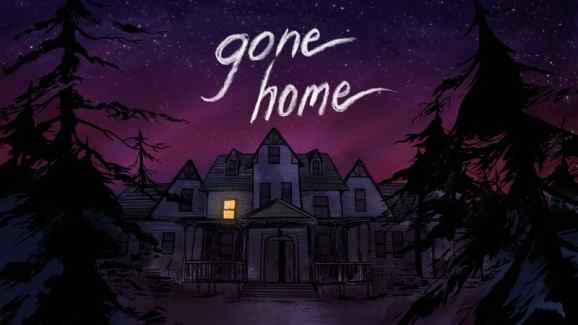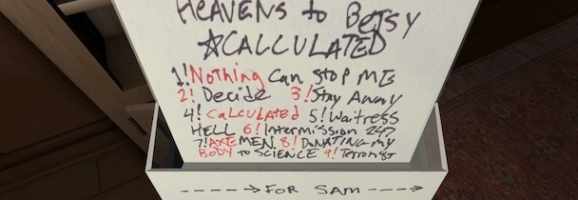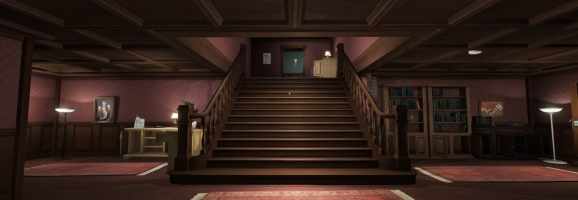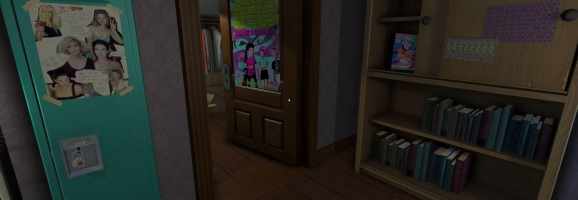The Problem With Gone Home

Gone Home is a slight, first-person adventure game, something of an “art game” with its focus on untraditional game narrative, from Portland developers The Fullbright Company. Players control Katie, a twenty-something invisible vehicle for the player, as she explores a vast, spooky mansion in Oregon after being away on vacation in Europe for a year. The game takes place in 1995.
Gone Home received a great deal of praise from critics and fans when it was released in 2013, becoming something of an indie hit. The game was praised for its unique approach to storytelling, and for its themes and “beautiful” writing. It instantly became an anti-Call of Duty (et al), and fans of the game will quickly cite it as an example of a game that is not targeted toward “white, young males.”
I’m always cautious toward claims of great or “amazing” writing in contemporary media, but I was still excited to play the game finally. What I experienced was a problematic game from the initial few moments, a nagging feeling that only intensified in the final moments of the game.
Gone Home as Genuine And Human
Gone Home does a lot right.
Its colloquial ‘90s language is spot on and is certainly “cool.” Bratmobile music and Sonic Youth posters and zines are all really cool and “in” and nostalgic and punk rock. The game earns major points for these details from fans and critics and even me, these details that give the game its otherworldly nostalgia.
The riot grrrl motif adds some genuineness to the characters and their world, and even for players who did not experience the era (or have any interest in punk) find themselves identifying and impressed.

On a side note: I can’t help but wonder how the game’s reception would have turned out if the music theme was deemed “uncool.” Would the game be as popular if the characters listened to Aaron Carter un-ironically? Would it feel as genuine or still be viewed as cool?
Even more important, though, is the queerness of the game. What games focus on being a teenage lesbian and focus on real emotions of real fictional people? Not a ton, not many at all. Katie’s exploration of the mansion reveals many secrets about her family, her sister Sam’s relationship with another girl being the highlight.
Gone Home is hardly subtle about its sense of queerness (it feels real enough, but still very in your face), due to its loose writing, but it gets points for “showing” (not “telling,” for all you creative writers) a story that people can relate to and be affected by. In terms of gaming, Gone Home is “progressive,” though never subversive or transgressive. The game seems to be informed by ‘90s cult hit My So-Called Life and this is a plus.
I’m wary of the claim that Gone Home is great because it is queer. Its story is an average, coming-of-age tale of a teenage girl discovering who she really is. Its depiction of a lesbian teenager is certainly relatable and realistic, if not a bit romanticized and idealized, but does Gone Home truly deserve “points” just for being queer?
We can look at popular games, see how they are targeted toward our “white, young male” demographic, and then make the claim that Gone Home is special because it’s different, that it changes the playing field of games, that it’s a milestone in storytelling in games simply due to its theme and focus. The game is certainly “real” enough, yet I have difficulty making a final judgment on it. Something to consider.
Playing the Game
Gone Home‘s opening reminds me of the original Resident Evil for the PlayStation. It’s dark and stormy outside, and players find themselves in this huge antechamber with a large staircase in the center, with moody doorways going off to the left and right. Even the wooden panels of the walls recall Raccoon City’s infamous mansion. At first glance, Gone Home is a “scary mansion” story, and thus stems from games like Resident Evil and films like The Shining. This is an important first impression.
Each room and corridor is dark (sometimes too dark), and players will often find themselves stumbling around, desperately looking for light switches in pitch black rooms. Thunder crashes in the background, and the house creaks eerily at certain intervals. Even the title screen makes the house seem haunted, with its dark hues and supernatural purples, a single light shining in a window on the second floor.

Pacing is one of Gone Home’s strong points, as players are constantly exploring new areas of the house as they uncover new tidbits of information. Visual cues, such as a father’s porn collection, are too scant, but nice when discovered.
As players explore the unfamiliar house, they receive information about a crazed, dead uncle, about ghosts and spirits, as well as a sprawling family disfunction, including a disparaged author father, a mother hung up on being a wife, and, the spotlight, Samantha, a teenage girl exploring her sexuality. Information is conveyed through notes and diary entries placed around the house, and Sam’s diary entries are accompanied by excellent audio that may give too much precedence to them.
For a story that seems to focus on Katie’s return and her discovery of her family’s secrets, much of the player’s time is spent solely on Sam’s character arc and her developing relationship with best friend turned girlfriend Lonnie, and their teenage punk shenanigans. The mother in particular gets shafted, and her story out of the three is by far the sparsest and least fulfilling. The three characters are too independent from each other, and even if Sam is the focus, more connections to her parents would have fleshed out each arc more.
The Horror of Gone Home
I’ll be the first to admit that tone and atmosphere are king and that plot is weak. One does not play Dark Souls for the plot, does not watch Clerks or Bergman or Fellini for plot. Memorable media has a heightened sense of atmosphere and tone, as well as character, and it is these elements that stick with an audience.
Gone Home goes to great lengths to be classically horrifying, but why is it so creepy?
At any point in the game, players feel like they’re trapped in the underwater dystopia, Rapture, of BioShock fame (fun fact: the lead designers of Gone Home actually did work on BioShock 2‘s Minerva’s Den) due to the dark, creaking corridors, and slow, careful crawl. Text and audio of seances and psycho houses amount to little, and while I won’t explain what exactly happens in the game’s final moments, these clues and hauntings do end up as nothing more than a tool to assist the tone and atmosphere.
Katie has never been to this mansion in Oregon, where her family has just moved. The house has a feeling of emptiness, which makes sense because a). it is unfamiliar to Katie, b). the family has recently (well, a year ago?) moved there, and c). because the house is the “Psycho House” where her uncle Oscar apparently went insane. But the game never even bothers to reconcile these mismatched tonal issues, and thus, the horror feels tacked on.

There’s a lot to be considered when trying to interpret Gone Home‘s eerie atmosphere. It could be argued that the emptiness and creepiness of the house parallels Katie’s distance from her family, and as players learn more about them through clues and notes, they become more at ease both with the family and with navigating the house.
Or perhaps, just as coming out of the closet to one’s parents could be akin to a final boss fight in a JRPG, the mansion’s labyrinthine and haunting qualities mirrors the confusion and excitement of Samantha’s realization and followthrough of her feelings toward another girl. The game is murky, disorienting, and maze-like, not to mention sort of horrifying, because that’s what being a confused teenager is like.
I don’t find either of these possibilities satisfying, though. Katie is such a first-person non-entity, that she never even matters. This distance to her family is only inferred, and the flashes of text from her thoughts only mire her character further (whenever she finds a postcard she sent her family, players get a “hey! that’s the postcard I sent my family!”). Samantha’s love story is hardly confused and is actually quite romantic, exciting, and actualizing. It barely mirrors the horrors of the house.
Late in the game, Katie stumbles upon a secret series of passageways in the house, which look like they’re straight out of something from Amnesia: The Dark Descent (fun fact 2: the prototype of the game was built in Frictional’s HPL Engine 2), and there are scattered zines everywhere, and some punk and riot grrrl allusions on the walls and tables. There are some great details here for the keen of eye, some nice aesthetic qualities, and it’s a lovely moment, except for the fact that the player is still stumbling around in this gloomy dungeon, holding her breath.
Several reviewers noted that the game felt real, that the house was real, but it’s entirely game-like and fictional, part-dungeon, part-sewer, part-Resident Evil. Stumbling upon this secret teen riot grrrl haven is nice and it does feel lived in. There are some interesting spatial relationships and lightings, but the sense of dread and dungeons lingers and is too jarring.
In another section, deep in the basement of the house, there’s a room that’s pitch black and the light switch doesn’t work. I accidentally closed the door on myself looking for anything on the floor, and was trapped in this black room for a few minutes while I searched for the door. It was horrifying and claustrophobic, and even though I knew nothing in the game could harm me, it was genuinely scary. A visceral experience, nonetheless, but a jarring one.
Gone Home is not a traditional (or really, untraditional) horror game, not a horror game at all, and thus these scares feel out of place. Proteus, another non-violent and nontraditional game, delivers a truly ecstatic and intimidating ending through some pastel colors and no text. Proteus is successful through gameplay alone. Gone Home’s plot and its characters have much more complexity than anything in Proteus, but that does not make them more effective.
Would Gone Home be interesting if it wasn’t scary? Would players want to control Katie and move through a normally sized, normally lit house and search for clues and keys? Or would it be too boring? Is it one of gaming’s fallacies, that a game cannot simply tell a story without also having a game-like intensity and structure? And is this even a fallacy, or perhaps, a strength that should be better utilized?

At the end of the game, even though I had read all of the clues and knew all of the truths, I still had the lingering feeling that something bad would happen to Katie, that she would find something horrible up in the attic. I knew it wasn’t going to happen, but there was a build up to it nonetheless, the ascent to the top floor only emphasizing the feeling. The final moments of the game were alright, but ultimately unfulfilling.
The Fullbright Company had a great setup, and certainly lots of talent and vision, but Gone Home fails in delivering an earth shattering game narrative. Obviously, something horror-related happening at the end of the game would not have saved Gone Home, that is not the issue. I didn’t necessarily feel cheated out of a “satisfying ending.” The whole of the game failed to leave a deep impression on me, despite its ‘90s nostalgia and queerness. Maybe it needed another layer, such as anthropomorphic animal characters (I’m serious) to help balance the tones and senses of reality.
Or perhaps, ultimately, this is the point of Gone Home, that a game can still be frightening and maze-like, look and sound like a traditional game, and still be completely non-violent and tell a nontraditional story.
What do you think? Leave a comment.











I think it is extremely important that Gone Home addresses queerness because honestly, queerness is almost invisible in the gaming industry. I think this game brings new ideas and sheds new light on what games can accomplish and discuss even in an industry that seems dominated by first person shooters. I agree with your last paragraph; this game takes the tropes of a horror game to tell a totally different story, which is where I think the beauty of this game lies.
It is incredibly short, the story is NOT new or interestingly told, and they do a very poor job of setting up any “scares” that could enter your mind wandering the house. I totally get what the developers were going for, but they did a very poor job executing on the way that they dangle some of the “scary” plotlines. Not to mention that the really freaky stuff is right before the game ends, so you have almost no time to start imagining what “could” have happened.
First of all, I haven’t “played” this so I might be wrong, but how does this even qualify as a game?
A game has rules and those rules decide whether the player has succeeded or failed. If you only walk around and experience the story without any objective or possibility of failing then this technically isn’t a game.
The other thing that bothers me is this obsession about making the gaming industry “mature and artistic”. Lets face it, the gaming industry will never be as artistically respected as for example poetry, music, visual arts etc. Yes, those forms of art are incorporated in video games (nice graphics, a good soundtrack), but at their core, games are about having FUN, not some “deep artistic meaning” gibberish.
Some of the most brainless, immature games that I have played were more FUN than these virtual exhibitions.
“At their core, games are about having FUN, not some “deep artistic meaning” gibberish.”
Why not both? The medium’s big enough that, just like film, gaming can support fun “brainless” experiences as well as games that try for deeper meaning. I mean, correct me if I’m wrong, but given that most games still ARE primarily designed for fun, but isn’t the obsession you talk about really more of a non-issue? The standard fare of the gaming industry isn’t going to be going away any time soon because of games like Gone Home, any more than the release of another Terrence Malick film is going to spell the end of the Michael Bay-style blockbuster explosion-fest.
It;s a video game. You walk around in a simulated world and interact with stuff. Call of Duty, same thing. You walk around in a simulated world and interact with stuff.
Gone Home is a really good story told in a interactive video format. So because its told in a interactive video format and have a great story does that qualify Gone Home as a video game? To give an example if I am a English teacher presenting my students with To Kill a Mockingbird a classic novel great story but I was going to have my students experience that in a interactive video format where the students would have the opportunity to move around and interact with certain things does that interactive story now qualify as a video game? This trend among some critics that the only thing that really matters in a video game these days is a great story and not much else such as challenge which I consider to be the most important element needed to creating something that qualifies as a video game I think is a really bad whacky trend. Not saying this article done this, but in general.
Videogame definition: A video game is an electronic game that involves human interaction with a user interface to generate visual feedback on a video device. The word video in video game traditionally referred to a raster display device,[1] but it now implies any type of display device that can produce two or three dimensional images.
Played this game through for the first time and I enjoyed it, but thank goodness it was only as long as it was. The premise was wearing quite thin by the end. I loved that the game felt a bit like the classic MYST to me in its presentation, and I loved the 90’s nostalgia. However, I feel this game wouldn’t have gotten the attention it has, and possibly not the high praise from critics, if not for the relationship subject matter with Sam. I felt they used her and her friend’s feelings as a gimmick more than as an integral part of the story as a whole. Just my opinion obviously.
The most artistic storytelling experience ever created in my opinion. Beautiful.
The first time I played through I was scared shitless of what was in that house but the minute I figured out what was going on all that went away. It’s a great story.
It sounds like the most problematic issues might be functions of personal preference rather than objective failings; I find this premise deeply intriguing. Either way, this is a very cogent analysis. I hadn’t heard of this title, and will seek it out now.
Personally, I like my games to be fun AND artistic, and am always pleased to see experimental, non-traditionial titles hit the shelves. I like a first-person shooter now and then myself, but given that the video game experience is predicated on the creation of a virtual world from scratch, it’s disappointing how in-the-same-box most game platforms are.
Thanks!
Gone Home was an excellent experience!
This was such a wonderful game. I wasn’t expecting to be so fully absorbed in the short story, but I was completely obsessed with finding every hidden note and audio journal entry, and I played for 4-5 hours straight. It really shows that games can be more than just action and violent FPS’s. Other developers should consider taking some inspiration from Gone Home’s story execution, as it has definitely raised the bar for videogame storytelling.
I believe the game is significant for its storytelling as it weaves a unique, unconventional and emotional narrative in ways that just aren’t possible in other mediums.
Story is incredibly predictable and cliche. Replace Lonnie with your stereotypical “bad boy from the wrong side of the tracks”, and you have a story that has been done to death. Which would be fine, many great games have lackluster stories, but great gameplay. Unfortunately this ‘game’ has zero gameplay. The entire experience hinges on the narrative.
/Kit Rico
Got to say I loved the pacing and exploration terms of the game but found the story to be a bit sappy and unexceptional. Its still a good story, mind you, but I wasn’t blown away. Still, the character of Sam is very good.
I can probably see why people are praising this game so highly, a narrative story is a powerful subject. However, there is a fine line on a actual game subject matter, than actual literature. I feel like Gone Home can be better praised as a book than a game.
Beautiful, thought triggering, touching and incredible game, one of the best games I’ve ever played. Post-play I sat at my computer in awe as the credits rolled. Growing up as a young punk music fan and feeling oppressed and misguided you feel like you can relate to Sam and Lonnie, in their perilous struggle to be themselves. Would go as far as to call this one a masterpiece.
This is a “Special” game. Just remarkable how something so simple can be so perfect.
Finished this game, found every note, book, nook and cranny. I am left with the feeling of, “So what?” I have played and collected video games since 1980. Point and click games like Syberia I & II, Keepsake, every Agatha Christe game leave a lasting impression of an accomplishment. One feels like they have actually been somewhere. Gone Home is just going through a beautiful house in search of a plot or a surprise.
I literally just finished this game an hour ago, and I think I’ve allowed the experience to sink in. I was completely expecting a horror game when I got it off Steam, and my stomach was in knots throughout the entirely of the playthrough. Sam’s story was touching and I actually felt an emotional connection to her and her plight. The wife’s infidelity/husbands’s writing career were just things to piece together, and the haunted-house backstory could have been fleshed out more. I’ve rarely played a game where I was waiting for something to happen for so long, and your points about it feeling creepy were spot-on. I was anticipating a survival horror game similar to Amnesia, but got an emotional and heart-wrenching story about one family’s struggle to accept their daughter. I loved it, and would give it a solid 9/10, it just felt like it left a lot on the table to be explored.
Gone Home feels incomplete to me. I get that they were going for the scary atmosphere, but they never really followed through. The main story with the sisters made it apparent that nothing was going to jump out at you in the house.
The house was integrated with the story, though. So, I’m not sure that it could have easily been a regular house with regular lighting.
I suppose this comment is coming a little late, but oh well. As far as the atmosphere goes, I actually thought it was a really interesting choice. I can agree that it’s a little disingenuous the way it was presented as a horror game (and being someone who is easily stressed out, I was freaking out for the majority of the game).
That said, as someone who got pretty into the storyline, I enjoyed the process of moving through the house and turning on all the lights, making it look lived in. It actually made me feel like the narrator had a purpose within the story: to come back and make the house a home again.
“these clues and hauntings do end up as nothing more than a tool to assist the tone and atmosphere.”
Disagree that this is all. Importantly it’s also a misdirection as to what will happen and what the ending will be, so it’s an integral part of the core mystery of the game. Partly the ghost part, but I also initially got the impression from the jfk notes that the father might be a conspiracy nut possibly turned murderer. Ghost, crazy dad and suicide (and even the “weirdo” Daniel) were all misdirections to make the ending less predictible and the mystery part richer. Imo.
Completly agree, although as the horror-vibe is present from the second you walk in the door, i’d say it’s more the love story that feels tacked-on.
I actually didn’t enjoy playing the game because i was expecting the horror to build (i didn’t know what the game was going in) so it was sort of disappointing. I looked at all the clues, but i only breezed through them because i was expecting jump scares every time i put them down, compounded by the fact that i found the Uncle’s crucifix and examined it, which led to what is actually the only jump-scare in the game. Still, when i got to the end, i couldn’t help but wonder why it was there in the first place. The story and atmosphere are completely irrelevant to each other.
*Spoilers below*
When i reached the part where you find the key to the attic, i just assumed that Sam had killed herself, and her body was waiting in the attic; that’s what her diaries implied, and that would have been the only way the atmosphere made sense. So actually i think the disappointment for me was *either* that it wasn’t a horror story, *or* that it wasn’t absent of horror.
I wonder what happened to Katie after the game ended, since her parents weren’t getting back for a few days…
Sounds l e the game is underwhelming m, and the fact that this hasn’t been discussed much if at all five years on supports that thesis.
Totally agreed.
Well, the whole reason am writing this comment is to be able to write my article about it, being a new in here an’ all, to be honest, if I knew that the game’s plot revolves around a queer couples, I wouldn’t waste 15$ on it.